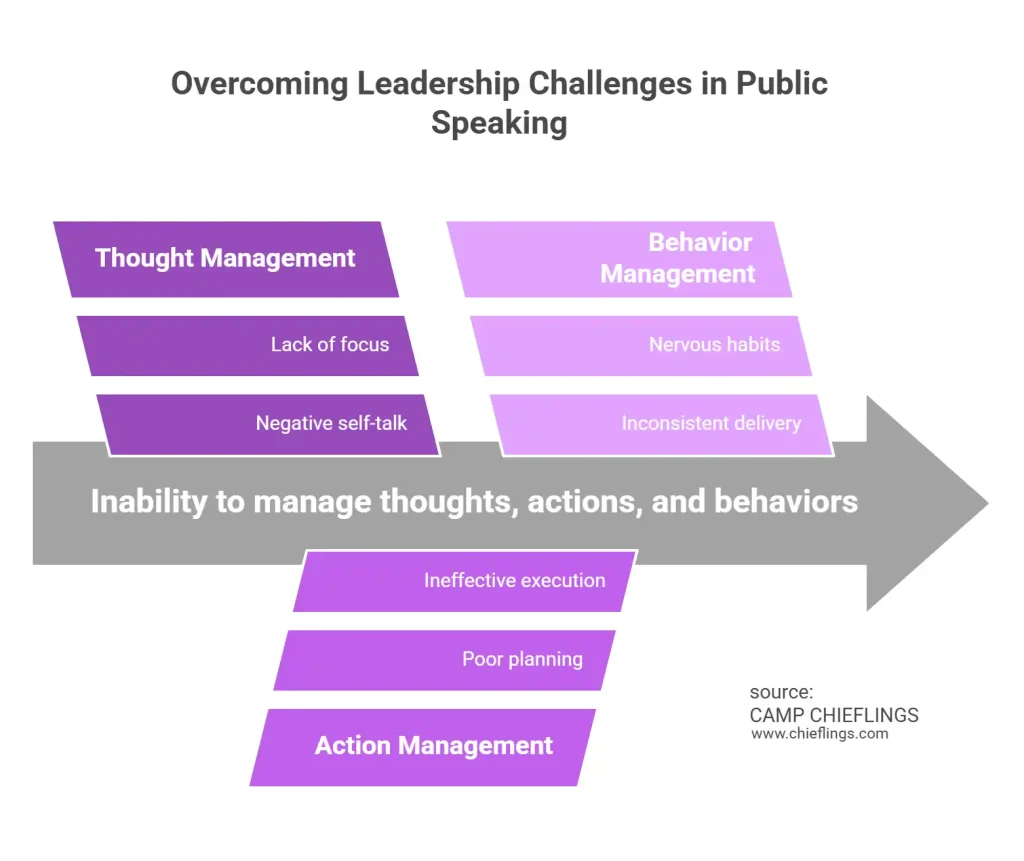“You were made for it [moderation]”
That’s what a friend and colleague recently told me when I asked if he could moderate a meeting in my stead. While I appreciate the sentiment, I know I wasn’t born with that ability. In truth, Public speaking isn’t one of my natural talents.
Maybe he said it from astute observation or to excuse himself from having to facilitate the meeting. Whatever the case, heaven knows I still struggle with public speaking.
But I’ve realized, from self-assessment and reflection, that I have made significant progress thus far. Today, I want to share what I’ve learned with fellow leaders who face the same challenge.
The Weight of Steward Leadership
As pastors, teachers, evangelists, coordinators, project managers, and CEOs, we carry unique responsibilities. We have projects to manage, relationships to maintain, and the constant challenge of balancing finances with mission scope.
With the stakes so high, the last thing a leader needs is a bad blow to the mission on account of his or her inability to manage their thoughts, actions, and behaviours.

Public speaking isn’t just a skill to have—it has become a key determinant of successful stewardship. Yet many of even the best leaders dread those moments when all eyes lock onto us, awaiting our words to guide, inspire, or inform.
The question isn’t whether you’re qualified to speak—it’s whether you’re willing to let fear rob your audience of what they need to hear.
8 Mental Exercises To Overcome Glossophobia and Empower Self-Leadership.
From 1:1 performance reviews to brainstorming sessions to stakeholder meetings to full-on speeches, the steps below would significantly improve your nerves. I use these tips to this day.
These steps have been structured with one simple goal in mind — to handle the negative emotions and get you comfortable enough to deliver powerful and thoughtful messages while enjoying the process altogether.
Step 1: Decide Enough is Enough
The breakthrough came when I realized something profound: the personal cost of fearing and dreading the act was more than doing the act itself.
I love my sanity, my inner peace, and tranquility so much that I no longer want to trade them for worry and anxiety. I decided that enough is enough. I had suffered far too long at the losing end of a bad deal. I had to rid myself of this emotional baggage.
Naturally, our brains default to fretting—worrying, contemplating, and fixating on what might go wrong. Instead of leaving it to its own devices, you can exercise executive overriding power by refocusing on our power of influence and the purpose of the meeting.
Here’s the truth: you can’t always wait for it to feel right. You can take this as your much-needed cue to feel fed up with the status quo. Realize that you have the responsibility, authority, and jurisdiction over your life.
As a steward leader, you are the custodian of your mind. You can take charge. You have the power to effect the change you want to experience.
Step 2: Be Intentional About What You Want to Change Concerning Your Public Speaking Performance
I also realized there was nothing I made progress with that I didn’t intentionally learn.
My use of filler words like “so” reduced when I decided enough was enough, and it was time for them to go.
I became more relaxed and open to authentic interactions when I really wanted to enjoy the process and connect with people.
I hated that speaking felt like a chore, so I made it my mission to change that experience.
Intentionality is the bridge between where you are and where you want to be.
Take a pen and a piece of paper. Draw a 2-column table and label both columns Area of Strength and Area of Weakness, respectively. Fill this table to the best of your knowledge, and then make a mental note and plan to address these concerns. Step out courageously and put in conscious effort towards it.
Step 3: Transform Your Belief System
The moments leading up to speaking events are crucial yet can be nerve-racking.
For me, as a believer, I speak out or mutter (depending on the ambience of the room) words of affirmation over myself. In the face of uncertainty, you need to be grounded in truth.
Be discerning to know what is true versus what is simply a product of suboptimal mental patterns. Hold onto the truth. Don’t deceive yourself, but be honest—if you haven’t done your due diligence, your concern or anxiety isn’t misplaced.
I try to do my best given the circumstances and trust God to cover any shortcomings.
Crystallize Your Learning
Example Affirmations I Use:
“God has deposited immense gifts and talents in me. Supernatural graces are multiplied to me.
I have a greater capacity for excellence than I can fathom. He gave me His Spirit. I will excel because an excellent spirit dwells within me. I am equipped for this. God’s glory shines through me every day, especially as I steward everything within my care.
All my faculties for speech are at my disposal. Mind, you will work with me and not against me.”
You need to stir yourself up. When your speech aligns with your beliefs and values—the ones you want to embody—it empowers your delivery.
Having done your due diligence, believe in your preparation, and believe in what God can do through you.
Go in the strength of your might.
Step 4: Just Be Authentic
Authenticity is key to connecting with any audience.
Be yourself. Speak at your own pace using your authentic voice and tone. Own the room and your message. Take your time.
Where applicable and appropriate, feel free to express and infuse emotion into your speech. It shows you’re human and makes it easy for people to relate to you, embrace you, and accept your message.
Handy Tips:
- Breathe deeply before starting
- Open with an icebreaker
Step 5: Refocus Your Perspective on Attention
I was speaking to my brother recently, and a conversation about public speaking came up. He said, and I paraphrase:
“It’s not that I can’t speak in public, but attention is the problem.”
I leaned in closer because it turns out we shared a common struggle. I dislike the attention. I dislike being in the spotlight.
Then I probed deeper with an open-ended question, hoping he might provide insight into this burning question, I asked, “What is it about attention that makes us avoid it?”
“It’s the gateway for criticism and judgment. Critical and judgmental comments can hurt, you know.”
That’s it! We hate the potential hurt, and we blame the attention. These are natural signals our brain uses to keep us “safe.”
The Reframe That Changes Everything
Here’s the problem: there’s no way you can facilitate a meeting without being noticed.
So with nowhere else to run, I stood to fight. It was then I saw there were both threats and opportunities, not threats alone.
If people are paying attention to me or what I’m saying, it means I possess an opportunity to influence: to change deep-rooted thoughts, challenge limiting beliefs, sow seeds of truth, educate and inform, showcase excellence, and change behaviors.
After all, these are the reasons why I’m speaking in the first place. There are more compelling reasons to speak than to sit it out because of fear.
As Covey rightfully quotes about courage:
Courage isn’t absent of fear, it is the awareness that something else is important.
– STEPHEN R. COVEY, author of The 7 Habits of Highly Effective People
Curated For You: The 7 Habits of Highly Effective People [Book Summary]
It’s also a sign that perhaps I am a person of value—people want my take on a matter. You must believe your message is valuable and worth listening to.
These realizations are essential for reframing how you perceive yourself and your public speaking ability.
Focus on your message and its potential for transformation. You really can’t focus on many things simultaneously, so keep the message in your heart and view. Be preoccupied with revealing your full message to your audience for the transformation it brings, leaving no room for intrusive negative thoughts.
Step 6: Aim for Momentum
For people like me who literally have to warm up to crowds, you can do this either in person before the talk (if possible) or during the initial stages of your presentation.
It will be uncomfortable initially, but if you weather through it you are home free to a powerful delivery and sense of fulfillment.
Aiming for momentum and not perfection will make you push beyond the discomfort and inertia. It will make you ignore the quirks and slip-ups.
Put one step in front of the other, or more accurately, one thought at a time, sentence after sentence.
Step 7: Self-Assess During Your Presentation
Some minutes into any presentation, I do what I call “Assess and Reassure.” It’s simply a check-in with my brain about how it’s faring and supplying what’s needed. All of this happens in milliseconds.
If I’m faring well, I hit myself with the “See, you’re doing just fine” comment. “You didn’t die; you’ve made it this far. Now just cruise and coast. Nothing left to fear.“
If I catch myself anxious or my voice shaking too much, I perform any conscious act of control—either by pausing a bit longer, pulling myself together, taking a deep breath, or looking around at the audience or the room (whether virtual or physical). Then I continue.
Step 8: Record, Review, Learn, and Improve
If appropriate, take a visual and audio recording of your speech. In your free time, review it closely for areas of strength and improvement.
Areas to Assess:
- Verbal cues: Filler words, pitch variation, tone, clarity
- Nonverbal cues: Body posture, hand gestures, eye contact, nervous habits
Bring in an extra pair of eyes for feedback. Make sure to take notes and set action items in place for both sustaining strengths and improving areas of weakness.
Continuous improvement tip: Expand your vocabulary by listening to news and commentary, watching movies, and reading articles like this one to discover new words and how they’re used in context.
Your Journey Forward
The path from fear to freedom in public speaking is forged by constant practice and willful determination, but it is trodden by those who have faith and reach for indwelling potentials.
Achinike Amadi
The journey is no short one. There would be bad days; days where you just want to hide underneath a rock, days you would make mistakes, days when it seems as though your efforts are producing no results.
In those days, remember: Every steward leader has something valuable to contribute, and your voice matters.
So pick yourself up and keep going with increased disdain for the bondage fear imposes.
Remember: you weren’t born to moderate, teach, or lead because it would be easy. You were called to these roles because you have something important to share with the world.
Your next speaking opportunity isn’t a threat to endure; it’s a platform to influence, inspire, and transform lives.
The choice is yours: Will you let fear keep you silent, or will you step into the freedom that comes with authentic, confident communication?


